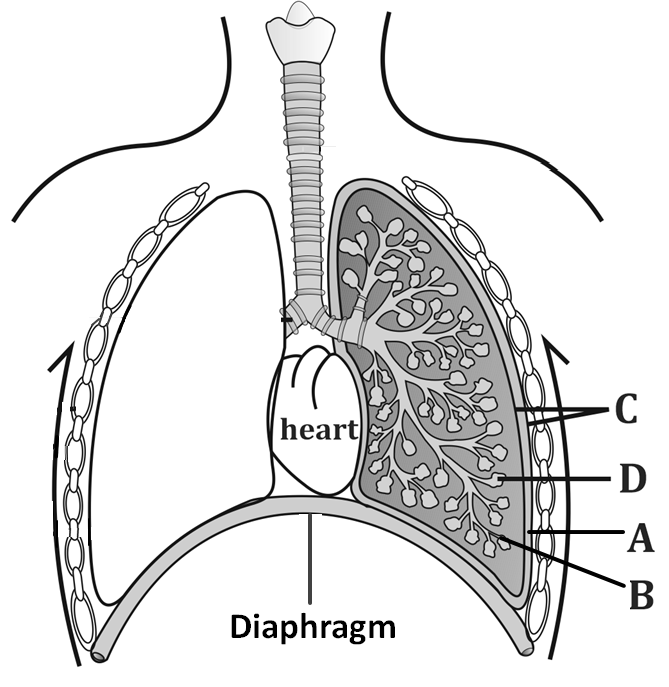
Identify the respiratory disorder shown in the figure above:
1. Bronchial asthma
2. Emphysema
3. Pneumoconiosis [occupational lung disease]
4. Tuberculosis

Identify the respiratory disorder shown in the figure above:
1. Bronchial asthma
2. Emphysema
3. Pneumoconiosis [occupational lung disease]
4. Tuberculosis
Identify the respiratory disorder shown in the given figure:
1. Bronchial asthma
2. Emphysema
3. Pneumoconiosis [occupational lung disease]
4. Tuberculosis

1. Bronchial asthma
2. Emphysema
3. Pneumoconiosis [occupational lung disease]
4. Tuberculosis

I: A is Oropharynx, B is Nasopharynx and C is laryngopharynx.
II: During swallowing, D prevents the entry of food into wind pipe and E prevents the entry of food into the nasal cavity.
1. Only I is correct
2. Only II is correct
3. Both I and II are correct
4. Both I and II are incorrect
1. The nasal cavity leads to the larynx, an intersection where the paths for food and air cross.
2. Air enters through the nostrils and is then filtered by hair, warmed, humidified, and sampled for odors as it flows through a maze of spaces in the nasal cavity.
3. The trachea branches into two bronchi, one leading to each lung.
4. During the swallowing of food glottis can be covered by a thin elastic cartilaginous flap called epiglottis.
Reason (R): The type of epithelial layer of serous membranes such as the pleura is the same as that found in alveoli.
In light of the above statements, choose the correct option:
1. (A) and (R) are true, (R) is the correct explanation of (A)
2. (A) and (R) are true, (R) is not the correct explanation of (A)
3. (A) is true, (R) is false
4. (A) is false, (R) is true
1. VC + FRC
2. IC + ERV
3. ERV + TV + IRV – EC
4. TV + IRV + FRC

Select the correct option.
1. B
2. A
3. C
4. D
Study the oxygen-haemoglobin dissociation curve given in the figure and select the correct statements regarding it:
| I: | The p50 is the pressure at which haemoglobin is 50% saturated which corresponds to about 27 mmHg on the X-axis. |
| II: | A right shift of the curve means haemoglobin holds less tightly onto oxygen and delivers more oxygen to the tissues at a given arterial oxygen pressure. |
1. Only I is true
2. Only II is true
3. Both I and II are true
4. Both I and II are false
Study the given figure showing the neural regulation of respiration in humans and select the correct statements from the given statements.
| Statement I: | The location of the pneumotaxic centre is the Pons of the brain stem and it moderates the function of respiratory rhythm centre. |
| Statement II: | The respiratory rhythm centre is the dorsal respiratory group shown in the figure and is also located in the Pons of the brain stem. |
1. Only Statement I is true
2. Only Statement II is true
3. Both Statement I and Statement II are true
4. Both Statement I and Statement II are false






.svg)


